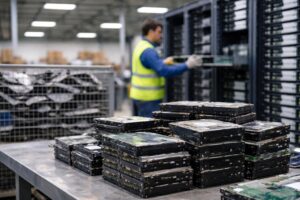Carbon capture and storage (CCS) is a technology that captures carbon dioxide (CO2) emissions from power plants and industrial processes before they are released into the atmosphere and then stores the CO2 in underground geological formations. This technology is seen as one of the most promising ways to reduce greenhouse gas emissions and mitigate the impacts of climate change. As more and more businesses are looking for ways to become more sustainable, carbon capture and storage is an important consideration. In this blog post, we’ll discuss why CCS is important and how it can help businesses to become more sustainable.
Why?
One of the main reasons why CCS is important is that it can help to reduce greenhouse gas emissions. Greenhouse gases, such as CO2, trap heat in the atmosphere and contribute to global warming. Power plants and industrial processes are major sources of CO2 emissions, and CCS can help to capture and store a significant portion of these emissions, preventing them from entering the atmosphere. Another vital aspect of CCS is that it can help to decarbonize the power sector. In order to combat climate change, it is essential that we transition away from fossil fuels and towards cleaner forms of energy. CCS can be used in conjunction with other technologies, such as renewable energy and nuclear power, to help to decarbonize the power sector.
What are the benefits?
CCS also has the potential to be a cost-effective solution. While the cost of CCS technology is still relatively high, it is expected to decrease as the technology becomes more mature and more widely adopted. Additionally, the cost of CCS is likely to be offset by the benefits of reduced greenhouse gas emissions and decarbonization. For businesses, CCS can help to improve their sustainability by reducing their greenhouse gas emissions and carbon footprint. This can not only help to mitigate the impacts of climate change but can also help to improve the reputation of the business, as more and more customers are looking for companies that are environmentally responsible. Furthermore, CCS can help to improve the competitiveness of businesses by reducing their energy costs. By capturing and storing CO2 emissions, businesses can use the captured CO2 as a feedstock for various industrial processes, reducing the need for other, more expensive, feedstocks. In addition, CCS can also help to create new business opportunities and industries. For example, the captured CO2 can be used for enhanced oil recovery, where the CO2 is injected into oil reservoirs to increase the amount of oil that can be recovered.
The challenges
While CCS is a promising technology, there are still some challenges that need to be overcome. One of the main challenges is the cost of CCS. The cost of CCS technology is still relatively high, and it will take time for the cost to decrease as the technology becomes more mature and more widely adopted. Another challenge is the need for more infrastructure for CO2 storage. In order for CCS to be successful, there needs to be sufficient infrastructure in place for the storage of CO2. This includes the identification and characterization of suitable storage sites, as well as the development of the necessary infrastructure, such as pipelines, to transport the CO2 to the storage sites.
What to keep in mind
In conclusion, carbon capture and storage is an important technology that can help to reduce greenhouse gas emissions and mitigate the impacts of climate change. It can also help improve businesses’ sustainability by reducing their carbon footprint and creating new business opportunities. While there are still some challenges that need to be overcome, such as the cost of CCS and the lack of infrastructure for CO2 storage, CCS has the potential to be a cost-effective and sustainable solution for businesses and industries. Ideally, companies should learn from their peers and explore how to prepare for the future. The Global Summit on Scope 3 Emissions Reduction will bring together key industry experts to learn more about reporting strategies & carbon data management in a small-scale, industry-driven event, on 20-21st April 2023 in Amsterdam, the Netherlands. The two-day, hybrid event features in-depth case studies of supply chain transformation, carbon accounting, and networking breaks dedicated to exchanging insights and expertise on tackling Scope 3 emissions. Visit future-bridge.eu and netzero-events.com or follow us on our social media to track other energy use and decarbonization events.




